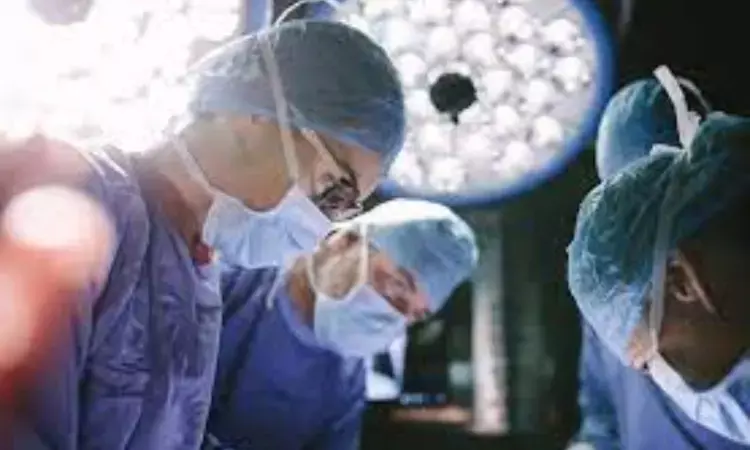- Home
- Medical news & Guidelines
- Anesthesiology
- Cardiology and CTVS
- Critical Care
- Dentistry
- Dermatology
- Diabetes and Endocrinology
- ENT
- Gastroenterology
- Medicine
- Nephrology
- Neurology
- Obstretics-Gynaecology
- Oncology
- Ophthalmology
- Orthopaedics
- Pediatrics-Neonatology
- Psychiatry
- Pulmonology
- Radiology
- Surgery
- Urology
- Laboratory Medicine
- Diet
- Nursing
- Paramedical
- Physiotherapy
- Health news
- Fact Check
- Bone Health Fact Check
- Brain Health Fact Check
- Cancer Related Fact Check
- Child Care Fact Check
- Dental and oral health fact check
- Diabetes and metabolic health fact check
- Diet and Nutrition Fact Check
- Eye and ENT Care Fact Check
- Fitness fact check
- Gut health fact check
- Heart health fact check
- Kidney health fact check
- Medical education fact check
- Men's health fact check
- Respiratory fact check
- Skin and hair care fact check
- Vaccine and Immunization fact check
- Women's health fact check
- AYUSH
- State News
- Andaman and Nicobar Islands
- Andhra Pradesh
- Arunachal Pradesh
- Assam
- Bihar
- Chandigarh
- Chattisgarh
- Dadra and Nagar Haveli
- Daman and Diu
- Delhi
- Goa
- Gujarat
- Haryana
- Himachal Pradesh
- Jammu & Kashmir
- Jharkhand
- Karnataka
- Kerala
- Ladakh
- Lakshadweep
- Madhya Pradesh
- Maharashtra
- Manipur
- Meghalaya
- Mizoram
- Nagaland
- Odisha
- Puducherry
- Punjab
- Rajasthan
- Sikkim
- Tamil Nadu
- Telangana
- Tripura
- Uttar Pradesh
- Uttrakhand
- West Bengal
- Medical Education
- Industry
Deep sternal wound infection after CABG tied to obesity, smoking,blood loss and increased intubation time

Denmark: A recent study published in American Heart Journal Plus: Cardiology Research and Practice has shed light on the factors linked with deep sternal wound infection (DSWI) after open-heart surgery in a Danish registry.
The researchers reported that an increased risk of deep sternal wound infection following open-heart surgery is a multifactorial problem; while some variables are unchangeable, others can be changed. They advise optimizing the patient's condition before the surgery, e.g. smoking and weight loss. Factors surrounding the patient should also be considered, e.g. minimizing intubation time and preventing blood loss.
Deep sternal wound infections are reported to be one of the most dreaded complications following median sternotomy concerning open-heart surgery (OHS). Mortality rates range between 14 and 30 %, and prolonged hospital stays. A decrease in mortality rates has been noted after the improved management of patients with DSWI and the introduction of Vacuum Assisted Closure (VAC).
The authors observed that the rate of DSWI after open heart surgery has remained unchanged during the last 30 years at 0.2–2.3 %. Noting that this is probably not a sign of lack of improvement in patient care, but rather because patients referred to surgery are older, have more comorbidities, and are more complicated than earlier.
Against the above background, Lisa Gundestrup, Odense University Hospital, Odense, Denmark, and colleagues conducted a multivariate analysis of variables associated with a deep sternal wound infection after open-heart surgery via median sternotomy.
For this purpose, the researchers extracted a retrospective cohort of all adult patients who underwent open-heart surgery at Odense University Hospital between 2000 and 2020 from the West Danish Heart Registry.
The study revealed the following findings:
- 15,424 patients underwent open-heart surgery, and 244 developed a deep sternal wound infection, equivalent to 1,58 %.
- After data review, 11,182 entries were included in the final analysis, of which 189 developed DSWI, equivalent to 1,69 %.
- Multivariate analysis found the following variables to be associated with the development of deep sternal wound infection (odds ratios): Known arrhythmia (1.70), Left Ventricular Ejection Fraction (1.66), Body Mass Index 25–30 (1.66), Body Mass Index 30–35 (2.35), Body Mass Index 35–40 (3.61), Body Mass Index 40+ (3.70), Age 60–69 (1.64), Age 70–79 (1.95), Chronic Obstructive Pulmonary Disease (1.77), Reoperation (1.63), Blood transfusion in surgery (1.09), Blood transfusion in intensive care unit (1.03), Known peripheral atherosclerosis (1.82), Current smoking (1.69), Duration of intubation (1.33).
"Our findings revealed that DSWI development is multifactorial, and pinpointing specific variables as the main cause is difficult," the authors wrote. "This study can point out areas that need consideration to eliminate DSWI."
They suggest that though there can be no change in some baseline variables, such as COPD, diabetes, and age, others, such as smoking, BMI, and arrhythmia, are factors that can be improved or prevented. "BMI reduction could be a point of focus when trying to reduce the risk of infection," the team pointed out.
Reference:
Gundestrup, L., Florczak, C. K., & Riber, L. P. S. (2023). Factors associated with deep sternal wound infection after open-heart surgery in a Danish registry. American Heart Journal Plus: Cardiology Research and Practice, 31, 100307. https://doi.org/10.1016/j.ahjo.2023.100307
Dr Kamal Kant Kohli-MBBS, DTCD- a chest specialist with more than 30 years of practice and a flair for writing clinical articles, Dr Kamal Kant Kohli joined Medical Dialogues as a Chief Editor of Medical News. Besides writing articles, as an editor, he proofreads and verifies all the medical content published on Medical Dialogues including those coming from journals, studies,medical conferences,guidelines etc. Email: drkohli@medicaldialogues.in. Contact no. 011-43720751


